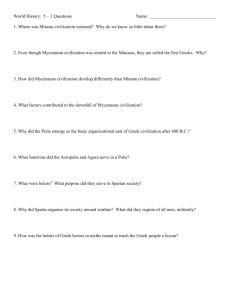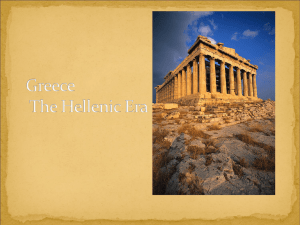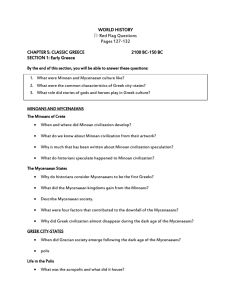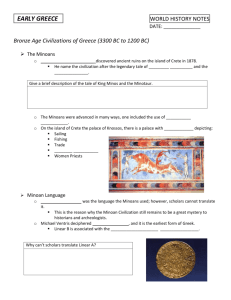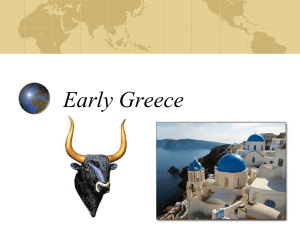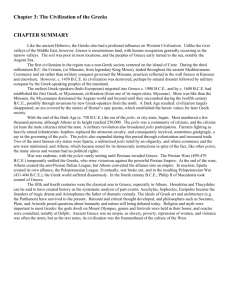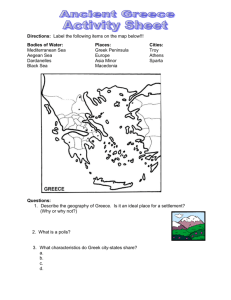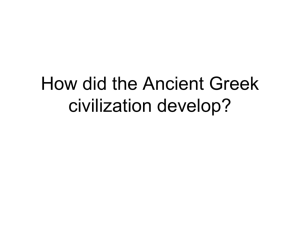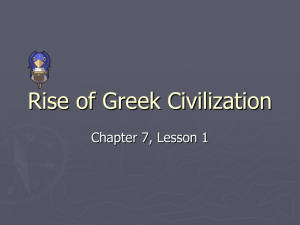15- 16 Chapter 7.1
advertisement
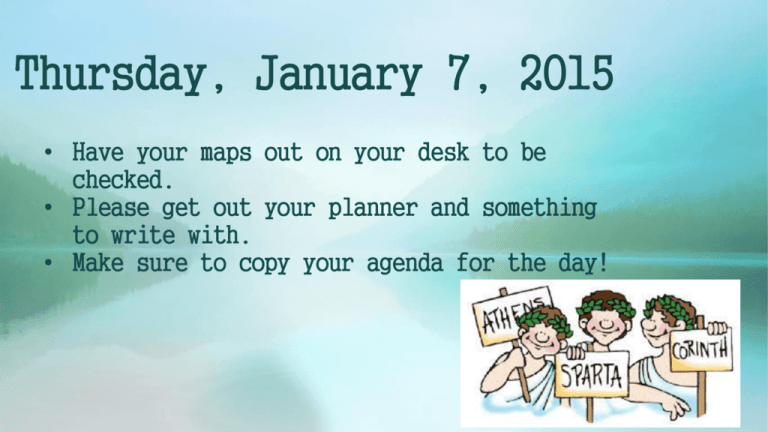
Thursday, January 7, 2015 • Have your maps out on your desk to be checked. • Please get out your planner and something to write with. • Make sure to copy your agenda for the day! Chapter 7: The Ancient Greeks Lesson 1 – Rise of Greek Civilization Mountains and Seas oGreek civilization began in an area dominated by mountains and seas. oThe Greek mainland is on the southern part of Europe’s Balkan Penisula. oA penisula is a body of land with water on three sides. oBetween these two lands are the waters of the Agean Sea. oThe Greeks came to think of their communities as small separate countries. An Island Civilization oGreek myths describe an early civilization that developed on Crete, an island southeast of the Greek mainland. oTrade was an important economic activity for the Minoans. An Island Civilization oSometime around 1450 B.C. the Minoan civilization collapsed. oHistorians believe either earthquakes destroyed the Minoan cities or people from the Greek mainland, known as Mycenaeans, invaded Crete. A Mainland Civilization oAbout 2000 B.C., the Mycenaeans left their homeland in central Asia and moved into mainland Greece. Mycenaen Kingdom oMycenaean palaces were centers of government. Traders and Warriors Minoan traders from Crete visited the Greek mainland and the Mycenaeans adopted features of Minoan Culture. oBy the mid-1400s B.C., the Mycenaeans had conquered the Minoans and controlled the Aegean Sea. A Dark Age oOver time, the Mycenaean culture declined due to fighting and earthquakes. oBy 1100 B.C., the Mycenaean culture had crumbled. A Dark Age oA Greek speaking group known as the Dorians invaded the Greek mainland and took control of most of the region. oThe next 300 years in Greek history are known as the Dark Age. oDorian warriors introduced iron weapons and skill of iron making. The Hellenes oBy 750 B.C., many descendents of the people who ran away returned to the Greek mainland. oSmall independent communities developed under local leaders who became kings. oThese people called themselves Hellenes, or Greeks. oFarmers grew more food, traded the surpluses, and developed a writing system that had 24 letters. Colonies and Trade oGreek communities began to send people outside the Aegean area to establish colonies due to a shortage of food. oMost of the colonies were along the Mediterranean Sea and the Black Sea. oColonies traded with their "parent" cities causing trade to increase and adding to a colony’s wealth. The Greek City-State oGreek communities became fiercely independent and nobles ruled many citystates. oEach city-state or polis was like an independent country. What Did a Polis Look Like? oThe polis was the basic political unit of Greek civilization. oAt the center of each polis was a fort built on a hilltop that had a fort called an acropolis. oOutside the acropolis was an open area called an agora, which was used as a marketplace. oCity-states were surrounded by mountains and sea, they were usually small. Parthenon What Did Citizenship Mean to the Greeks? oWe owe many of our ideas about citizenship to the ancient Greeks. oIn Greece, male citizens had the right to vote, hold public office, own property, and defend themselves in court. oCitizens had the responsibility to serve in government and fight for their polis. oIn most city-states, only free, land-owning men born in the polis could be citizens. oWomen and children might qualify for citizenship, but they had none of the rights that went with it. Citizen Soldiers In Greece, wars were fought by wealthy nobles riding horses and driving chariots. oBy 700 B.C., citizens called hoplites made up the armies. oCitizens put the needs of the polis above their own, but were not unified as a whole country which made Greece easy to conquer.
